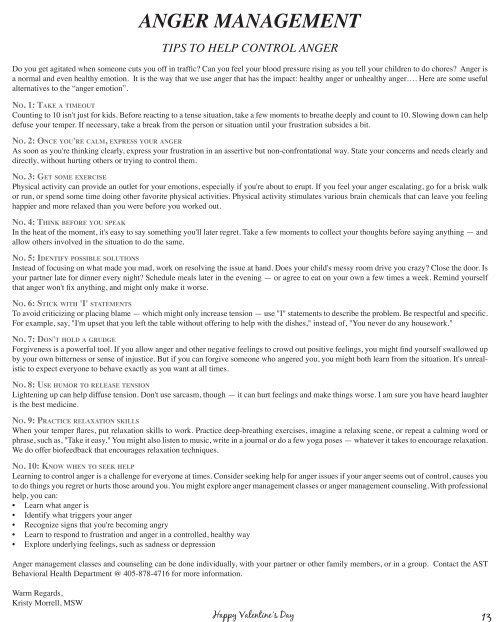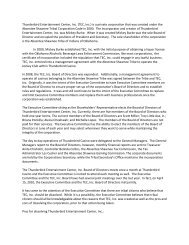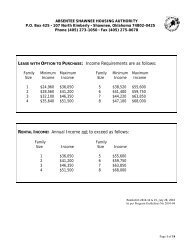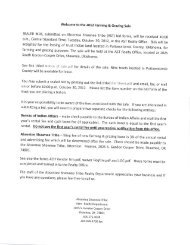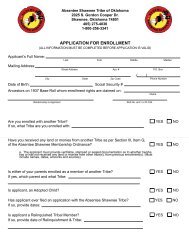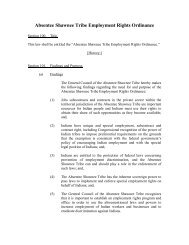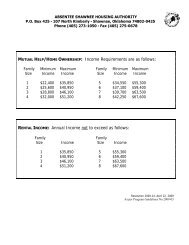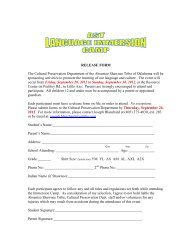February 2012 - Absentee Shawnee Tribe Of Oklahoma
February 2012 - Absentee Shawnee Tribe Of Oklahoma
February 2012 - Absentee Shawnee Tribe Of Oklahoma
Create successful ePaper yourself
Turn your PDF publications into a flip-book with our unique Google optimized e-Paper software.
ANGER MANAGEMENT<br />
TIPS TO HELP CONTROL ANGER<br />
Do you get agitated when someone cuts you off in traffic Can you feel your blood pressure rising as you tell your children to do chores Anger is<br />
a normal and even healthy emotion. It is the way that we use anger that has the impact: healthy anger or unhealthy anger…. Here are some useful<br />
alternatives to the “anger emotion”.<br />
No. 1: Take a timeout<br />
Counting to 10 isn't just for kids. Before reacting to a tense situation, take a few moments to breathe deeply and count to 10. Slowing down can help<br />
defuse your temper. If necessary, take a break from the person or situation until your frustration subsides a bit.<br />
No. 2: Once you're calm, express your anger<br />
As soon as you're thinking clearly, express your frustration in an assertive but non-confrontational way. State your concerns and needs clearly and<br />
directly, without hurting others or trying to control them.<br />
No. 3: Get some exercise<br />
Physical activity can provide an outlet for your emotions, especially if you're about to erupt. If you feel your anger escalating, go for a brisk walk<br />
or run, or spend some time doing other favorite physical activities. Physical activity stimulates various brain chemicals that can leave you feeling<br />
happier and more relaxed than you were before you worked out.<br />
No. 4: Think before you speak<br />
In the heat of the moment, it's easy to say something you'll later regret. Take a few moments to collect your thoughts before saying anything — and<br />
allow others involved in the situation to do the same.<br />
No. 5: Identify possible solutions<br />
Instead of focusing on what made you mad, work on resolving the issue at hand. Does your child's messy room drive you crazy Close the door. Is<br />
your partner late for dinner every night Schedule meals later in the evening — or agree to eat on your own a few times a week. Remind yourself<br />
that anger won't fix anything, and might only make it worse.<br />
No. 6: Stick with 'I' statements<br />
To avoid criticizing or placing blame — which might only increase tension — use "I" statements to describe the problem. Be respectful and specific.<br />
For example, say, "I'm upset that you left the table without offering to help with the dishes," instead of, "You never do any housework."<br />
No. 7: Don't hold a grudge<br />
Forgiveness is a powerful tool. If you allow anger and other negative feelings to crowd out positive feelings, you might find yourself swallowed up<br />
by your own bitterness or sense of injustice. But if you can forgive someone who angered you, you might both learn from the situation. It's unrealistic<br />
to expect everyone to behave exactly as you want at all times.<br />
No. 8: Use humor to release tension<br />
Lightening up can help diffuse tension. Don't use sarcasm, though — it can hurt feelings and make things worse. I am sure you have heard laughter<br />
is the best medicine.<br />
No. 9: Practice relaxation skills<br />
When your temper flares, put relaxation skills to work. Practice deep-breathing exercises, imagine a relaxing scene, or repeat a calming word or<br />
phrase, such as, "Take it easy." You might also listen to music, write in a journal or do a few yoga poses — whatever it takes to encourage relaxation.<br />
We do offer biofeedback that encourages relaxation techniques.<br />
No. 10: Know when to seek help<br />
Learning to control anger is a challenge for everyone at times. Consider seeking help for anger issues if your anger seems out of control, causes you<br />
to do things you regret or hurts those around you. You might explore anger management classes or anger management counseling. With professional<br />
help, you can:<br />
• Learn what anger is<br />
• Identify what triggers your anger<br />
• Recognize signs that you're becoming angry<br />
• Learn to respond to frustration and anger in a controlled, healthy way<br />
• Explore underlying feelings, such as sadness or depression<br />
Anger management classes and counseling can be done individually, with your partner or other family members, or in a group. Contact the AST<br />
Behavioral Health Department @ 405-878-4716 for more information.<br />
Warm Regards,<br />
Kristy Morrell, MSW<br />
Happy Valentine’s Day<br />
13


